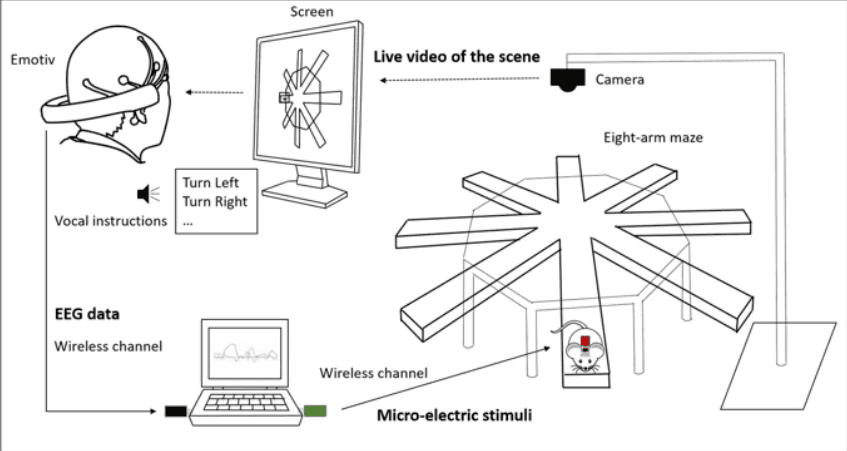Human Mind Control of Rat Cyborg’s Continuous Locomotion with Wireless Brain-to-Brain Interface
Share:





Shaomin Zhang, Sheng Yuan, Lipeng Huang, Xiaoxiang Zheng, Zhaohui Wu, Kedi Xu & Gang PanAbstractBrain-machine interfaces (BMIs) provide a promising information channel between the biological brain and external devices and are applied in building brain-to-device control. Prior studies have explored the feasibility of establishing a brain-brain interface (BBI) across various brains via the combination of BMIs. However, using BBI to realize the efficient multidegree control of a living creature, such as a rat, to complete a navigation task in a complex environment has yet to be shown. In this study, we developed a BBI from the human brain to a rat implanted with microelectrodes (i.e., rat cyborg), which integrated electroencephalogram-based motor imagery and brain stimulation to realize human mind control of the rat’s continuous locomotion. Control instructions were transferred from continuous motor imagery decoding results with the proposed control models and were wirelessly sent to the rat cyborg through brain micro-electrical stimulation. The results showed that rat cyborgs could be smoothly and successfully navigated by the human mind to complete a navigation task in a complex maze. Our experiments indicated that the cooperation through transmitting multidimensional information between two brains by computer-assisted BBI is promising.Access article here.
Shaomin Zhang, Sheng Yuan, Lipeng Huang, Xiaoxiang Zheng, Zhaohui Wu, Kedi Xu & Gang PanAbstractBrain-machine interfaces (BMIs) provide a promising information channel between the biological brain and external devices and are applied in building brain-to-device control. Prior studies have explored the feasibility of establishing a brain-brain interface (BBI) across various brains via the combination of BMIs. However, using BBI to realize the efficient multidegree control of a living creature, such as a rat, to complete a navigation task in a complex environment has yet to be shown. In this study, we developed a BBI from the human brain to a rat implanted with microelectrodes (i.e., rat cyborg), which integrated electroencephalogram-based motor imagery and brain stimulation to realize human mind control of the rat’s continuous locomotion. Control instructions were transferred from continuous motor imagery decoding results with the proposed control models and were wirelessly sent to the rat cyborg through brain micro-electrical stimulation. The results showed that rat cyborgs could be smoothly and successfully navigated by the human mind to complete a navigation task in a complex maze. Our experiments indicated that the cooperation through transmitting multidimensional information between two brains by computer-assisted BBI is promising.Access article here.
Shaomin Zhang, Sheng Yuan, Lipeng Huang, Xiaoxiang Zheng, Zhaohui Wu, Kedi Xu & Gang PanAbstractBrain-machine interfaces (BMIs) provide a promising information channel between the biological brain and external devices and are applied in building brain-to-device control. Prior studies have explored the feasibility of establishing a brain-brain interface (BBI) across various brains via the combination of BMIs. However, using BBI to realize the efficient multidegree control of a living creature, such as a rat, to complete a navigation task in a complex environment has yet to be shown. In this study, we developed a BBI from the human brain to a rat implanted with microelectrodes (i.e., rat cyborg), which integrated electroencephalogram-based motor imagery and brain stimulation to realize human mind control of the rat’s continuous locomotion. Control instructions were transferred from continuous motor imagery decoding results with the proposed control models and were wirelessly sent to the rat cyborg through brain micro-electrical stimulation. The results showed that rat cyborgs could be smoothly and successfully navigated by the human mind to complete a navigation task in a complex maze. Our experiments indicated that the cooperation through transmitting multidimensional information between two brains by computer-assisted BBI is promising.Access article here.
Solutions
Support
Company

© 2026 EMOTIV, All rights reserved.

Your Privacy Choices (Cookie Settings)
*Disclaimer – EMOTIV products are intended to be used for research applications and personal use only. Our products are not sold as Medical Devices as defined in EU directive 93/42/EEC. Our products are not designed or intended to be used for diagnosis or treatment of disease.
Note on Translations: Non-English versions of this website has been translated for your convenience using artificial intelligence. While we strive for accuracy, automated translations may contain errors or nuances that differ from the original text. For the most accurate information, please refer to the English version of this site.
Solutions
Support
Company

© 2026 EMOTIV, All rights reserved.

Your Privacy Choices (Cookie Settings)
*Disclaimer – EMOTIV products are intended to be used for research applications and personal use only. Our products are not sold as Medical Devices as defined in EU directive 93/42/EEC. Our products are not designed or intended to be used for diagnosis or treatment of disease.
Note on Translations: Non-English versions of this website has been translated for your convenience using artificial intelligence. While we strive for accuracy, automated translations may contain errors or nuances that differ from the original text. For the most accurate information, please refer to the English version of this site.
Solutions
Support
Company

© 2026 EMOTIV, All rights reserved.

Your Privacy Choices (Cookie Settings)
*Disclaimer – EMOTIV products are intended to be used for research applications and personal use only. Our products are not sold as Medical Devices as defined in EU directive 93/42/EEC. Our products are not designed or intended to be used for diagnosis or treatment of disease.
Note on Translations: Non-English versions of this website has been translated for your convenience using artificial intelligence. While we strive for accuracy, automated translations may contain errors or nuances that differ from the original text. For the most accurate information, please refer to the English version of this site.